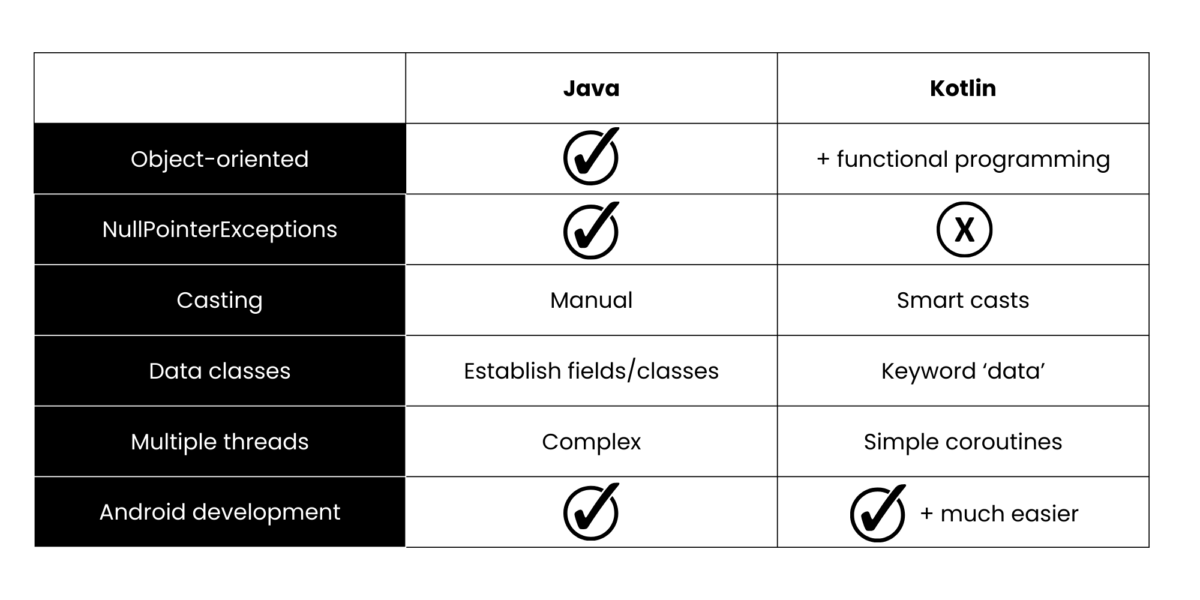

There is a never-ending debate between Kotlin and Java developers – which is the better programming language? Is one better than the other for certain reasons?
Here’s what the experts have to say
“Kotlin is tremendously versatile. It can be used for mobile, web, server-side, desktop, and even embedded systems development. Thanks to its mechanisms for sharing code, you can easily create multiplatform libraries and applications that work on multiple platforms.” – JetBrains, Kotlin developers.
“While Microsoft does not share all of Oracle’s ambitions for Java, we agree that it is a very valuable tool for software developers.” – Bill Gates.
What we’ll cover
In this article, we will explore the origins, history, features, and use cases of both languages to help you make an informed decision about which to use. We’ll start with the background of programming languages in general and finish with an easily digestible comparison table between Java and Kotlin.
So, keep reading to find out the key differences between Kotlin and Java, as well as which would be the preferred option for different purposes, and whether Kotlin replacing Java is a real thing. Android development, in particular, will be covered at the end – so, if you want to develop android apps, or discover android api design, with one of these languages, keep on reading!
Programming language(s): a background

Before we jump into the Kotlin vs Java debate, let’s first take a step back and look at getting a general understanding of what programming languages are and how they evolved.
A programming language is formally constructed for sending instructions to a machine – namely, a computer. Programming languages can be used to create programs that control the behavior of a machine or to express algorithms.
A brief history of programming languages
The foundations for modern programming languages were laid when the first machine algorithm was written during Ada Lovelace and Charles Babbage’s work on the Analytical Engine in the 1830s. In 1949, Assembly Language was first used to simplify machine code, which was necessary for instructing computers.
Autocode, developed in 1952 by Alick Glennie, was the first compiled programming language, meaning it could be directly translated into machine code. In 1957, FORTRAN was invented by John Backus for high-level scientific, mathematical, and statistical computations.
This is still in use today along with C, which was developed by Dennis Ritchie in 1972. Many languages in use today, including C++, Java, and Python are extensions or derivatives of C.
Origins and history of Java and Kotlin
Java
Java is a versatile, Object-Oriented, high-level programming language with numerous features that make it an attractive choice for developers. It was originally created by James Gosling at Sun Microsystems (which has since been acquired by Oracle) in the early 1990s.
The language was designed to have a “C-like” syntax that would be easy for programmers to learn and use. However, Java is a more powerful and versatile language than C++, which is another popular programming language.
Java quickly became one of the most popular programming languages in the world and is still widely used today. That’s because it’s simple to use compared to a “harder” language such as C++.
Kotlin
Kotlin is a relatively new programming language that was first introduced in 2011 by JetBrains, a software development company that is known for its popular IntelliJ IDEA Java IDE (Integrated Development Environment).
Kotlin programming language was designed to be a more concise, efficient, and readable alternative to Java, with which it is fully compatible and can be used side-by-side with existing Java code. Kotlin has gained popularity in recent years and is now used by major companies such as Google, Netflix, Amazon, and Twitter.
Java: when should it be the preferred language?
What makes Java Stand out?
There are a few golden nuggets that make Java stand out amongst other languages. Firstly, the language is platform independent, meaning that programs written in Java can run on any operating system that has a Java Virtual Machine (JVM).
Secondly, Java is a statically typed language, which means that variables must be declared before they can be used. This can help to prevent errors, as well as making the code easier to read and understand.
Thirdly, the Java language has a rich set of libraries that provide a wide range of functionality. Finally, Java is backed by a large and active community of developers who are always working on new tools and libraries.
Some examples with use cases
Java is often used for developing enterprise-level applications such as e-commerce websites, banking systems, and CRM (Customer Relationship Management) systems.
The language is commonly used for developing Android apps too. Java is also a popular choice for scientific and numerical computing, as well as Big Data applications.
Java virtual machine
What should you know about Java virtual machine? It’s important to be aware of the fact that Java is a compiled language, which means that code is converted into machine-readable instructions before it is executed.
However, unlike other compiled languages such as C++, the Java compiler does not produce machine code for a specific CPU. Instead, it produces bytecode, which is a platform-independent code that can be executed by a Java Virtual Machine (JVM).
The JVM itself is dependent on the operating system on which it is run, acting as a processor or “virtual” machine. Because it is aware of the specific instruction lengths of the operating system and other characteristics, the JVM is what makes Java itself platform-independent.
Kotlin: when should it be the preferred language?
What makes Kotlin stand out?
While its predecessor, Java, is limited to object-oriented programming, Kotlin combines that with features of functional programming as well. The latter is interoperable with the former and can be called from existing Java code naturally, having a rich set of libraries that provide wide-ranging functionalities.
Some examples with use cases
Kotlin is often used for developing Android apps, as well as web applications and server-side applications. The language is also commonly used for developing cross-platform applications that can run on multiple operating systems.
Kotlin is also a popular choice for developing microservices, as well as data science applications.
Android App Development
This use case is worth describing separately, as Android app development is one of the most popular uses for Kotlin. While Java has been the go-to language for Android development for a long time, Kotlin is a more modern option that is becoming increasingly popular. For some, Kotlin became a new Android language used in mobile development to write Android apps, compile code, as well as for replacing other programming languages.
Some of the key benefits of using Kotlin for Android development include:
- Full compatibility with existing Java code, so you can gradually migrate your app to Kotlin without having to rewrite everything from scratch.
- Faster development times and reduced costs thanks to Kotlin being a much more concise language than Java, meaning you can write less code and achieve the same results.
- Many features are specifically designed for Android development, such as built-in support for null safety and Android Extensions.
So, if you’re starting a new Android project, Kotlin is definitely worth considering as your primary development language.
Kotlin in the backend
Multiple benefits come from adopting Kotlin for backend systems. Both beginners and advanced devs can apply it. For example, the Kotlin plugin can make an ideal transition tool for a Java developer, as it allows easy conversion of Java to Kotlin.
See how different industries adopt Kotlin for their backend and server-side operations. It may give you some initiative to consider switching or starting using Kotlin for your purposes.
- FinTech – The finance sector can be an excellent environment for Kotlin to thrive in development. In FinTech, it can aid in supporting hundreds of thousands of users at the same time. For example, Pivotal has been using Kotlin for its backend development since 2016.
- Marketplaces – E-commerce and online marketplaces are essential branches of digital business sectors. Ensuring they can safely serve hundreds of thousands of users monthly is crucial to their operation. One of the prime examples of companies that embraced Kotlin in their backend is Faire. The velocity of Kotlin features made developing their web application an exciting and preferable option. Other e-commerce platforms are Alibaba, South Korean Coupang, and a giant – Wayfair.
- Entertainment – Kotlin has made its way into streaming services. Most streaming giants like Netflix or gaming-oriented Twitch use it for mobile apps. Amazon uses Kotlin for their backend in Prime Video service. Also, although Kotlin is not recommended for developing games in their core structure, some smaller productions like Horde, TetroCrate, Asteroid++, and Ore Infinium were created using Kotlin.
Kotlin vs Java, which is better?

Like with everything, it depends – so here we’ll look at the key differences. But first, let’s see why someone might even ask this question.
Why even compare Java vs Kotlin?
While Java is one of the most popular and commonly used programming languages in the world, Kotlin is a relatively new competitor. The latter is not yet close to taking over the mantle from the former yet, but it is proving to be a good alternative for the development of Android apps,
The growth of Kotlin has accelerated greatly since being recognized as Google’s 2nd official language for programming Android apps in 2017, and later declared their favorite for this purpose in 2019. That’s why someone in Android development might want to know if Kotlin or Java would be the better option for their needs.
Key Differences: Kotlin vs Java
Object-oriented
One key difference between Java and Kotlin is that the former is primarily an object oriented programming language while the latter also supports functional programming. This means that Kotlin code can be more concise and expressive than Java code, as well as enabling extra features like type-safe builders.
NullPointerExceptions
Another difference is that in Java it is possible to attribute a null value to any variable, meaning it refers to no object and so referencing it will bring the NullPointerExceptions into play. In Kotlin, on the other hand, trying to attribute null values to variables or objects by default will stop the code from compiling.
Casting
Casting an object in Java requires checking the variable type according to the operation, whereas casting checks in Kotlin are handled by its smart casts feature to automatically manage redundant casts.
Exceptions
Kotlin developers are also not required to go through the often frustrating and time-consuming process of catching or declaring exceptions, while Java coders do. This does, however, ensure robust code with proper error handling.
Data classes
Developers need to establish the fields or variables to store data, the constructor, and the getter/setter functions for the fields/variables and some other functions in Java. Kotlin, meanwhile, simplifies the process of creating data classes by requiring only the inclusion of the keyword “data” in the class definition.
Multiple threads
Both languages enable the creation of multiple background threads to handle lengthy operations, avoiding difficulties in the main thread where components belonging to the same application run in Android Studio. This is a complex task in Java, whereas Kotlin has a straightforward coroutines solution.
Android development
Finally, Kotlin has better support for Android development than Java does. This includes features like null safety and Android Extensions that make developing Android applications with Kotlin much easier than with Java. Android developers enjoy the Kotlin compiler, making each Kotlin project way more efficient.
Summary of differences

Kotlin vs Java: Which is better for Android development
If you’re wondering whether Java vs Kotlin is better for Android development, the answer isn’t necessarily clear cut. Both have their own benefits and drawbacks. However, certain factors may make one more suitable for your needs than the other.
With Kotlin, you can enjoy many features that aren’t available in Java. For example, Kotlin has null safety built into the language, meaning you can avoid those pesky NullPointerException errors. It also supports data classes and lambdas, which can make your code more concise and expressive.
However, Kotlin language does have some drawbacks. For example, it doesn’t have as much support from the Android community as Java does. And because it’s a relatively new language, there are still some kinks that need to be ironed out if you decide to write code with Kotlin.
So, which one should you choose – Kotlin or Java? If you’re starting a new project from scratch, Kotlin may be the way to go – especially if you’re in the group of Android developers. However, if you’re working on an existing project that’s written in Java then it may be best to stick with that language for now, even though that code can be called from Kotlin.
Conclusion
Java is a proven and stable language that has been around for many years, is easy to learn, and has a large community of developers who can offer help. Kotlin is a newer language without the same level of support, yet its several advantages mean that more developers are beginning to use it for coding.
Choosing Kotlin vs Java is no walk in the park, but it’s all coming down to your project.
Both Java and Kotlin are both popular programming languages that are often used for Android development, with their own strengths and weaknesses. Choosing the right one for your needs comes down to personal preference, and this article has gone through some of the key differences between kotlin vs java to help you pick.
If you are looking for software developers to help your business with its Kotlin or Java development projects, contact DAC Digital for more information..
Reach out to us for an optimal solution for your business.




